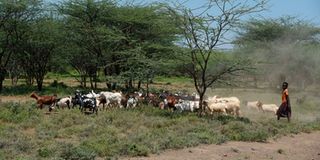Asal communities decry ‘discriminatory’ land reforms

A girl herds livestock in the semi-arid Riongo village of Tiaty, Baringo County. Indigenous peoples and members of rural community in arid and semi-arid lands (Asals) have decried discriminatory land reforms and disregard of the customary tenure system.
Indigenous peoples and members of rural community in arid and semi-arid lands (Asals) have decried discriminatory land reforms and disregard of the customary tenure system which they claim have denied them their legal right to own and manage their parcels.
During a joint facilitation of Indigenous Movement for Peace Advancement and Conflict Transformation (Impact) Kenya, the National Land Commission (NLC) and other partners including Natural Justice, DLCI and Namati, they agreed on the importance of open discussions that focus on creating a platform for real voices of community members and their leaders, forest dwellers, hunters and gathers, women, youth and the disabled, with direct and robust engagement with national and county government representatives on the progress made in the implementation of the Community Land Act, 2016 (CLA2016).
The Act seeks have communities secure legal title deeds for their traditional lands. It also seeks to ensure that women, youth and ethnic minorities have a role in managing the land. However, its implementation has been hard.
Compulsory acquisition
The Act limits the compulsory acquisition by the state of any interest in, or right over community land only in the instance where the compulsory acquisition is, first, in accordance with the law, and for a public purpose or upon prompt payment of just compensation to the person or persons, in full or by negotiated settlement.
Impact director Mali Ole Kaunga said the Act aspires to foster these rights and address the prolonged unresolved historical land and natural resource injustices.
His organisation works in Kenya’s arid north and supports communities to secure land rights through the Community Land Act.
“It is five years down the line since the promulgation of the Community Land Act, 2016. Communities continue organising themselves to meet the requirements proclaimed in the Act and timelines.
“The law guides customary landholding communities towards securing discrete collective titles to their lands. While not compulsory, formalisation is accepted by communities and government alike as now urgent to double-lock their constitutionally recognised possession,” he said.
Unlawful acts
The summit revealed that there has been alleged unlawful acts by some county governments that are disposing former trust lands prior to transitioning to community land, contrary to the stipulations of Section 6 (8) and Section 10 (2) of the CLA2016.
The Act requires community land rights to be registered in accordance with its provisions and the provisions of the Land Registration Act, 2012.
In this respect, a certificate of title issued by the community land registrar shall be evidence of ownership of the land. This certificate is not be subject to challenge, except on grounds of fraud or misrepresentation to which the person is proved to be a party or where the certificate of title has been acquired illegally, unprocedurally or through a corrupt scheme.
The registration of a community as the proprietor of land vests in it the absolute ownership of that land while the registration of a community as the proprietor of a lease confers upon it the leasehold interest described in the lease, together with and subject to all implied and express rights and privileges.





